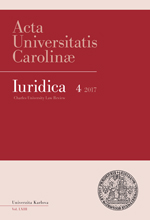Hans Kelsen a založení Československa
Hans Kelsen and the Formation of Czechoslovakia
Author(s): Thomas OlechowskiSubject(s): Law, Constitution, Jurisprudence
Published by: Univerzita Karlova v Praze, Nakladatelství Karolinum
Keywords: Treaty of Trianon; opinion on the question of the genesis of the Czechoslovak State and Czechoslovak citizenship; Hungary-Czechoslovak mixed arbitral tribunal; formation of a state; formation of Czech
Summary/Abstract: Following the Treaty of Trianon from 1920, the Hungary-Czechoslovak Mixed Arbitral Tribunal was established as a body resolving issues which arose from the annexation of the previously Hungarian territories to the newly-formed Czechoslovakia. A central question of numerous disputes was whether the Treaty’s protective provisions applied to Hungarian nationals, now living in annexed Czechoslovakian territories, whose property was confiscated by the state. The Czechoslovakian government presented several documents in support of its interpretation, among them Kelsen’s ‘Opinion on the question of the genesis of the Czechoslovak State and Czechoslovak citizenship’. In his work, Kelsen presented his theoretical views regarding the formation of the state and then applied them to the formation of Czechoslovakia. A state, according to Kelsen, comes to existence when there is a sovereign law, which is effective in certain personal and territorial jurisdiction, i.e. the state must have its own set of enforceable rules, by which its citizen abide by. International recognition, on the other hand, plays no role whatsoever. Applying his theory, Kelsen concluded, that Czechoslovakia as a sovereign state was formed on the 28th of October 1918, when the ‘Czechoslovak declaration of independence’ (as the first constitution), was proclaimed. Therefore, all Hungarian nationals, who were Czechoslovakian citizens according to the Czechoslovakian law passed after that date, remained as such until they opted otherwise under the Treaty of Trianon, which meant that they could not count themselves as Hungarians at the time the Treaty was signed and as a result, the provision regarding the banning of any confiscation did not apply to them. Even though these arguments were refused by the Tribunal in 1931, Kelsen’s farreaching theoretical ideas dealing with the formation of the state were not forgotten and remain relevant to this date.
Journal: Acta Universitatis Carolinae Iuridica
- Issue Year: 63/2017
- Issue No: 4
- Page Range: 13-22
- Page Count: 10
- Language: Czech

